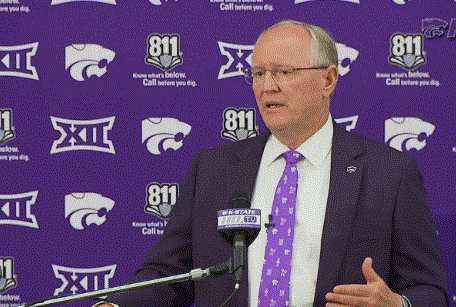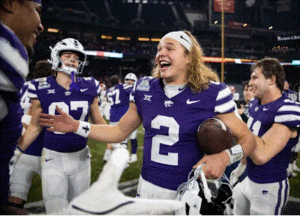
Tennessee’s Nico Iamaleava Enters Transfer Portal Amid NIL Dispute — Why Avery Johnson’s Path at Kansas State Looks Different
In a surprising move that’s rocked the college football landscape, Tennessee’s starting quarterback, Nico Iamaleava, has reportedly decided to enter the NCAA transfer portal. The decision comes in the wake of unresolved tensions surrounding his Name, Image, and Likeness (NIL) agreement. Iamaleava, once a prized recruit, has been in negotiations with the university to restructure his NIL contract, reportedly seeking to elevate it into the $4 million range. However, the school has chosen not to amend the original terms, prompting the quarterback to consider opportunities elsewhere.
Iamaleava, a standout four-star recruit from Long Beach, California, shares a recruiting class with Kansas State quarterback Avery Johnson. Yet despite similar on-field talent, the decisions made by these two signal-callers highlight fundamental differences in their paths and mindsets.
Avery Johnson: Loyal, Grounded, and Rising
Unlike Iamaleava, Johnson’s commitment to Kansas State runs deeper than just football or finances. A native of Kansas, Johnson grew up a Wildcats fan. His relationship with the program is rooted in long-standing loyalty and pride in representing his home state. This connection appears to give him a grounded presence in the locker room, one that’s not easily swayed by external offers or temporary uncertainties.

Even though Johnson’s performance on the field would certainly justify a push for a more lucrative NIL deal — and perhaps he could even command a similar multi-million-dollar offer — there’s no indication that he plans to pursue that route, at least not in the near term.
His commitment to the Wildcats was further exemplified when he played a pivotal role in recruiting Dylan Edwards, a talented running back who transferred to K-State and was also Johnson’s childhood teammate. Johnson’s presence and leadership have clearly become a cornerstone of the program’s identity under head coach Chris Klieman.
“Johnson has just got an infectious personality and that aura about him,” said Klieman in a recent interview with K-State Sports. “He’s embraced it and taken it to the next level. He’s not afraid to hold others to the standard he expects.”
This quote encapsulates Johnson’s growing maturity and leadership — traits that have helped him elevate not only his own play, but also the performance of those around him.
Performance Comparison and Transfer Trends
From a performance standpoint, Johnson’s first year as Kansas State’s starting quarterback was highly impressive. He tallied over 2,500 passing yards and 525 rushing yards, placing him in elite company. In fact, he and Alabama’s Jalen Milroe were the only two quarterbacks in the Power Four conferences to hit those statistical marks last season.
Under Johnson’s leadership, the Wildcats compiled a 9-4 record, finishing with a dramatic 44-41 bowl victory against Rutgers. Their success was fueled not just by numbers, but by intangibles like poise, adaptability, and team unity — all of which Johnson helped cultivate.
By contrast, Iamaleava’s exit from Tennessee adds to a growing trend in college football, where top-tier quarterbacks are increasingly changing schools in search of better opportunities, playing time, or financial incentives. Of the eight quarterbacks ranked ahead of Avery Johnson in the 2023 recruiting class, only two — Arch Manning (Texas) and Christopher Vizzina (Clemson)—have stayed with their original programs. The others have already transferred, highlighting the volatility of the current NCAA landscape.
In this era of short tenures and quick moves, Johnson’s unwavering commitment to Kansas State is becoming a rarity. His decision to remain a Wildcat — despite having the credentials to demand more — reflects a player focused on building something lasting, not just for himself but for the university and its fans.
Looking Ahead
Kansas State will kick off its 2025 season with high hopes, and Johnson will be at the heart of it all. Their season opener — a marquee matchup against Iowa State in Dublin, Ireland — could be a defining moment not only for the team but also for Johnson’s evolving national profile.
As schools continue to navigate the turbulent waters of NIL negotiations and transfer portal rules, players like Johnson represent a stabilizing force. His story contrasts sharply with that of Iamaleava — not necessarily in talent, but in trajectory. One is moving on due to unmet financial expectations. The other remains grounded, leading his team with purpose and pride.
Conclusion
Nico Iamaleava’s departure from Tennessee underscores the growing influence of business dynamics in college sports. While NIL is an empowering tool for student-athletes, it also introduces new challenges and risks for team stability.
In contrast, Avery Johnson is carving out a path defined by loyalty, leadership, and performance, setting an example for how athletes can navigate this evolving landscape with both integrity and ambition. As college football’s ecosystem continues to shift, programs will increasingly value not just raw talent but players who offer the intangibles that make teams great.
Leave a Reply